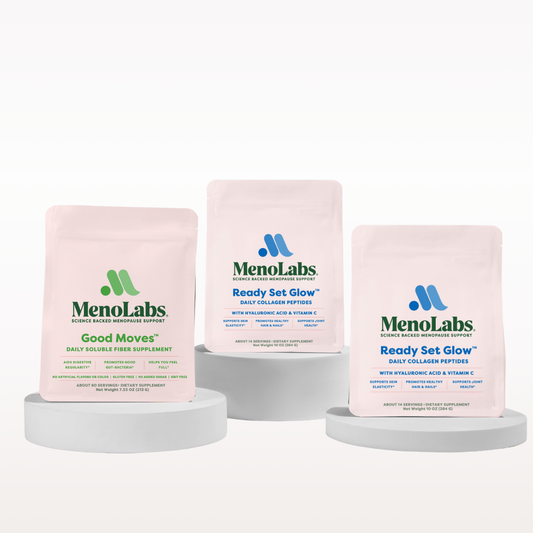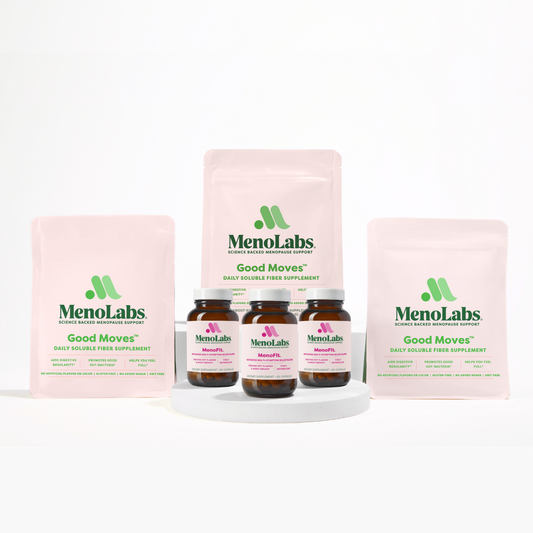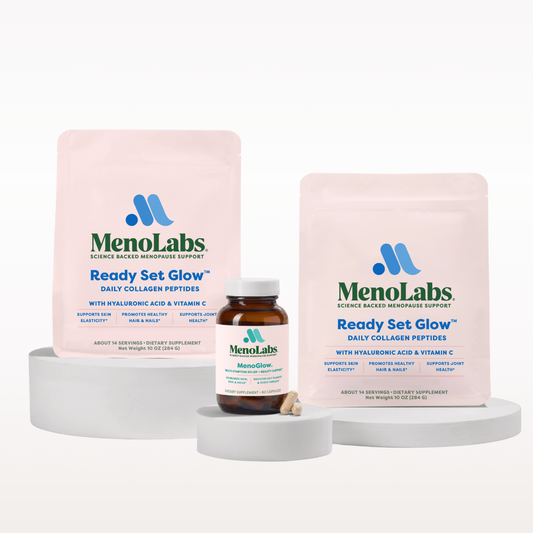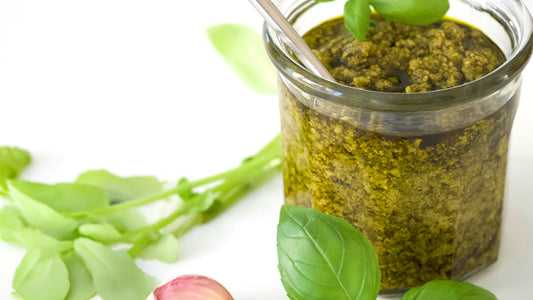
- Health
- Immune Health
- Relationships
How to Take Care of Your Vaginal Health During Menopause
Here's what you need to know about what's happening to your vagina during your menopause transition and how to feel better now.
1 min read
Our vaginas (much like the rest of our bodies) change as we enter midlife. The drop in estrogen can definitely affect our down-there areas, causing dryness, itchiness, and more frequent UTIs. We're also at a higher risk for infections due to the changes in pH in our vaginal microbiome.
Here's what you need to know about what's happening to your vagina and how to take care of it.
Why is my vagina changing?
Blame the drop in estrogen.
Estrogen protects and stimulates vaginal secretions, this is why, before menopause, the surface of your vagina is moist and plump. The loss of estrogen causes changes to your natural lubrication and can cause your vagina to become dryer. The vaginal tissues become thinner, less elastic, and more fragile. Sex may become painful and there may even be bleeding after a romantic session. Your bladder becomes positioned lower so your partner may bump up against it, causing UTIs.
The drop in estrogen can also shift the balance of good bacteria and bad bacteria, which increases risk to bacterial vaginosis (BV) and other infections. You're also more likely to contract sexually transmitted diseases such as gonorrhea.
In short, your vagina deserves extra special love and care in midlife.
Healing Vaginal Dryness
Women need not suffer from vaginal dryness. Your doctor may suggest an internal vaginal moisturizer with hyaluronic acid (this can also help restore balance to your microbiome) or offer other options. There's evidence that a healthy vaginal microbiome can also easy vaginal dryness so you may want to try supplements that encourage the proliferation of good bacteria (lactobacillus). A good vulvar moisturizer can also provide relief from dryness and itchiness.
Lubricants are also your friend. Adding a generous dose of water-based lubricant can go a long way to making sex a lot more comfortable. There are many to try so it's good (and fun!) to start trying out a few to see what feels best.
If your vaginal dryness and painful sex doesn't improve, your next stop is your gynecologist. They may suggest a topical estrogen cream or other delivery mechanism to alleviate your symptoms. They'll tell you how often to use them and when.
Check your body products
Despite what the marketplace tells us about how our vaginas need to smell, all that's needed is gentle soap and water. Scents and harsh chemicals can irritate your fragile tissues, cause UTIs, and cause you to spend money on things that bring you no benefit. There's no need to douche, ever. If you like a body wash, find one that's unscented and gentle.
Switch to cotton underwear
It's time to give your underwear drawer a refresh. Synthetic fabrics can irritate your vagina, trap in moisture (not the good kind) and welcome bacteria. Cotton has come a long way from granny panties, check out styles that make you feel sexy and confident and consider tossing your old ones.
Get better sleep
Can a good night's sleep help your vaginal health? Yes! In addition to giving you the rest you need, the stress of insomnia and sleeplessness can affect your brain and body and worsen your menopause symptoms. And let's be frank, we're all less inclined to want to have sex when we're exhausted.Have More Sex
Use it or lose it. Having more sex is actually a good idea, because arousal helps to moisten the walls of your vagina and help keep it elastic and relieve dryness. It's great for stress relief, which provides benefits to your entire body and mind.
Back to pain during sex. It's so important for you speak to your gynecologist frankly about it so that you can enjoy intimacy again. Don't worry about embarrassment, we're past that! Same with your sexual partner. Communicate with them about what you're experiencing. When sex is a party of two, that means both of you have a stake in helping to find solutions to these issues so you can navigate it together.
Related Products
Blend Besties Bundle
Fresh Start Bundle
4.7 / 5.0
(552) 552 total reviews











